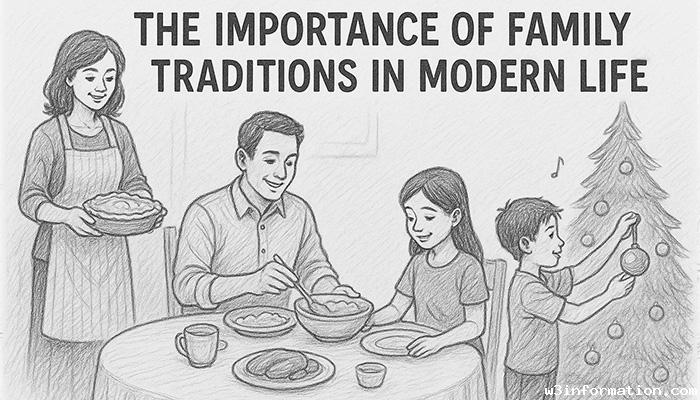The Importance of Family Traditions in Modern Life
As people become more isolated from their extended families modern times demand traditions to counter feelings of loneliness. Family rituals that happen regularly either face-to-face or online create both emotional support and connections.
The customs that occur during death anniversaries and remembrance events create structured ways to work through grief. Lighting a candle during a loved one's birthday or making annual visits to their grave creates meaningful remembrance while supporting emotional healing.
Family traditions enable individuals to stop their busy activities and create meaningful interactions with each other. These rituals counter modern multitasking habits by fostering mindfulness which includes active listening and valuing shared moments.
- Family Traditions function as an Important Mental Health Component
- Concrete Recommendations for Maintaining Existing Family Traditions or Establishing New Ones
- Family Traditions in Diverse Modern Contexts
- Navigating Special Circumstances
- The Future of Family Traditions
- Conclusion
- More Related Topics
Family Traditions function as an Important Mental Health Component
Families must work through multiple challenges to make family dinners a priority even though they offer significant benefits.
• Busy schedules: The daily schedules of parents and children include multiple commitments such as work, school activities, extracurricular events, and social gatherings.
• Technology distractions: The presence of phones and televisions along with other screen devices can disrupt important personal interactions.
• Different dietary needs or preferences: Providing meals which satisfy various taste preferences and nutritional needs often seems daunting.
• Lack of time or energy to cook: The end of a long workday makes meal preparation seem like just another chore to add to your crowded schedule.
The identification of these obstacles marks the initial phase for developing practical solutions.

Concrete Recommendations for Maintaining Existing Family Traditions or Establishing New Ones
Be Intentional
Explore the family practices that possess emotional and cultural importance to your family. Select family traditions that match both your personal values and your available time.
Start Small
Simple rituals gain significance through regular practice. The bedtime gratitude practice along with Saturday morning pancakes and seasonal nature walks provide perfect initial activities.
Involve Everyone
Make sure every family member provides their own ideas and preferences. When children participate in family activities they develop a sense of ownership which fosters their enthusiasm.
Be Open to Change
Embrace the flexibility to adapt traditions to fit your evolving life situations while maintaining their core meaning. Virtual holiday celebrations maintain their emotional importance for participants.
Document and Share
Keeping family traditions alive involves recording stories and recipes along with family photos. Scrapbooks along with digital albums and audio recordings serve as essential tools for transferring memories.
Family Traditions in Diverse Modern Contexts
Single-Parent and Blended Families
Rituals serve as a stabilizing force in non-traditional family structures. Children find security in new dynamics through the creation of fresh traditions or the modification of existing ones.
Migrant and Diaspora Families
Families living outside their homeland depend on traditions to maintain their connection to their cultural origins. Traditional festivals and native dishes serve as important tools for preserving cultural identity within multicultural settings.
LGBTQ+ Families
Diverse family structures require traditions that include and validate everyone. Adoption anniversary celebrations and chosen family gatherings create an ongoing sense of love and unity while establishing familial legitimacy.
Navigating Special Circumstances
Single-Parent and Blended Families
All types of households benefit from having regular family dinners. The core principle is connection. A secure and nurturing space emerges when one parent eats together with their child. Blended families who establish new dinner rituals create opportunities for unity and shared identity among members.
Teens and Resistance
Teenagers often resist attending family dinners because they seek independence from their parents or have other social obligations. To navigate this:
• Keep communication open and respectful
• Involve them in meal decisions and planning
• Allow some flexibility while maintaining consistency
The objective is to make dinner feel like a selection rather than an obligation.
The Future of Family Traditions
Balancing Technology and Presence
Technology helps families maintain connections over long distances but it risks taking attention away from immediate face-to-face interactions. Families need to intentionally establish periods without screens to participate in uninterrupted family traditions.
Integrating Sustainability
Current family traditions incorporate environmental principles through practices like zero-waste celebrations and eco-friendly birthday gifts that include tree planting. These practices enable families to fulfill their duties towards both their family members and the planet.
Workplace and Community Integration
The blending of work and personal life has led employers and communities to understand how traditions contribute to well-being. Supporting personal traditions in the workplace leads companies to achieve both employee satisfaction and retention.
Conclusion
Family traditions remain essential tools that build identity, resilience and connection within our constantly evolving world. These rituals give people stability amid today's fast-paced world regardless of whether they come from family history or new beginnings. The maintenance and advancement of family traditions builds a strong emotional base that enables individuals, families, and societies to prosper.
 DIY Holiday Decor Ideas on a Budget
DIY Holiday Decor Ideas on a Budget
 How to Create a Healthy Meal Plan for the Week
How to Create a Healthy Meal Plan for the Week
 Discover your top 10 comforting meals to enjoy during the winter season
Discover your top 10 comforting meals to enjoy during the winter season
 Tips for Stress-Free Holiday Travel
Tips for Stress-Free Holiday Travel
 Mobile Video Editing Apps to Try
Mobile Video Editing Apps to Try
 Mobile Health Apps: Best of 2025
Mobile Health Apps: Best of 2025